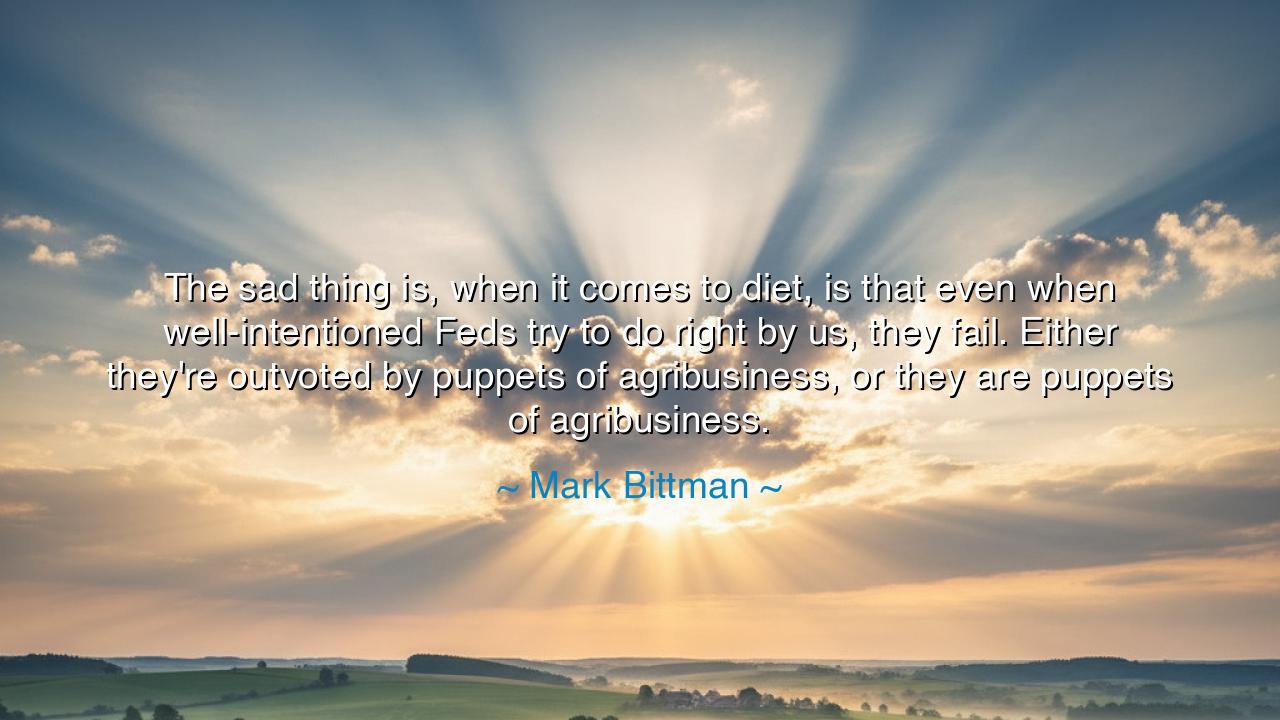
The sad thing is, when it comes to diet, is that even when
The sad thing is, when it comes to diet, is that even when well-intentioned Feds try to do right by us, they fail. Either they're outvoted by puppets of agribusiness, or they are puppets of agribusiness.






When Mark Bittman wrote, “The sad thing is, when it comes to diet, is that even when well-intentioned Feds try to do right by us, they fail. Either they're outvoted by puppets of agribusiness, or they are puppets of agribusiness,” he was not merely speaking of food policy—he was unveiling the tragedy of corrupted virtue, the ancient story of how good intentions perish under the weight of greed. His words pierce like an oracle’s lament: they tell of a society that has lost its guardians, a people betrayed by those sworn to protect them, and a truth as old as civilization—that when power and profit sit at the same table, justice often goes hungry.
In this lament we hear echoes of the ancients, who knew too well the seduction of wealth and the fragility of moral courage. The phrase “puppets of agribusiness” calls to mind not only the literal manipulation of government by industry, but the symbolic enslavement of human will by desire. Plato, in The Republic, warned that when rulers cease to be philosophers—when wisdom yields to appetite—then the state becomes sick in soul. What Bittman names “agribusiness” is but a modern Hydra, a many-headed beast of profit and propaganda, feeding not on grain but on the ignorance and dependency of the people.
The “well-intentioned Feds” of his quote are the tragic heroes of this modern epic. They enter their posts with purpose, seeking to improve public health, to reform broken systems, to nourish the nation. Yet, like Prometheus chained to his rock, their noble aims are punished by forces greater than themselves. In the halls of governance, truth speaks softly, but money thunders loudly. Policies meant to guide citizens toward wholesome food are reshaped by invisible hands—hands that sell sugar as sustenance and call poison by the name of profit. Thus, even those who mean well become ensnared, their strings pulled by unseen masters.
The ancients warned that every empire carries within it the seed of decay, planted by corruption of the commons—the point where private desire overcomes public duty. In ancient Rome, the state distributed free bread to pacify its people while the elite feasted on the spoils of conquest. So too today, the machinery of agribusiness fills our markets with abundance that starves the body and dulls the spirit. The people are not nourished—they are appeased. And the tragedy, as Bittman notes, is that this decay persists even among those who wish to cure it, for they are outnumbered, outvoted, or bought outright.
Consider the tale of Cincinnatus, the Roman farmer called from his plow to save his nation from peril. He took command, defeated the enemy, and when victory was won, returned to his field rather than cling to power. Such virtue is the opposite of what Bittman laments. Today, few return to the plow; most remain in the palace. The modern rulers of food—corporate and political alike—have forgotten the humility of the soil. They speak of “feeding the nation,” yet they sow the fields with chemicals and deceit. The ancient virtue of stewardship has been replaced by extraction, and the health of the people has become collateral for the profit of the few.
Yet within this darkness lies Bittman’s deeper challenge—a call not to despair but to awakening. He tells us that while the system is corrupt, our power has not vanished; it has merely been forgotten. The ancients believed that the strength of a civilization was measured not by its rulers, but by the wisdom of its citizens. When the state fails to guide rightly, it is the duty of the people to guide themselves. To see through illusion, to question authority, to eat consciously and live deliberately—these are the acts of quiet rebellion that restore balance.
The lesson is clear: never surrender your agency to those who profit from your ignorance. The body is your temple; its care is your sacred charge. Do not wait for governments to fix what conscience can heal. As Bittman teaches, “less meat, less junk, more plants” is not only a dietary creed—it is a moral one. It is the way of returning to harmony, of reclaiming what was lost when trust was traded for convenience. For every citizen who chooses truth over propaganda, simplicity over excess, becomes a small revolution unto themselves.
So remember this, children of the age of industry: when the shepherds falter, the flock must learn to lead itself. Eat with awareness, live with purpose, and let your choices be your protest. For the empires of greed fall not by force, but by famine—when the people refuse to feed them. Mark Bittman’s words, mournful though they seem, are the prophecy of renewal: that through the wisdom of the many, the power of the few shall wane. The soil still remembers purity; so too can we.






AAdministratorAdministrator
Welcome, honored guests. Please leave a comment, we will respond soon